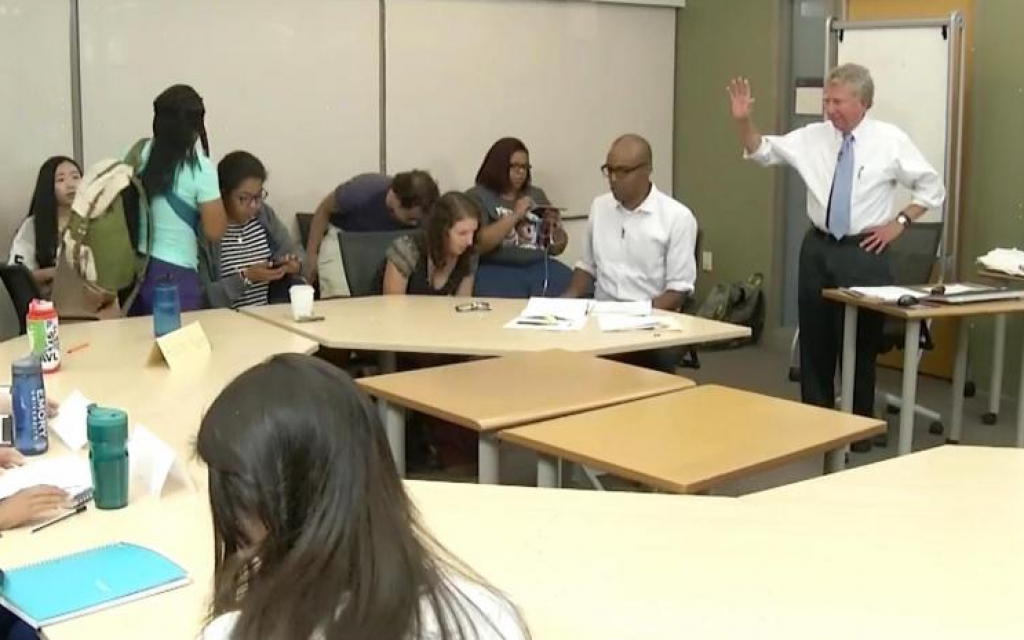Klibanoff Credits His Judaism for Prize Winning Work
Pulitzer Prize and Peabody Award winner Hank Klibanoff is "incredibly proud to be Jewish, and... certain that it is the teachings of Judaism" that guide him.

Hank Klibanoff has come a long way from his childhood, where, as one of the few Jews in Florence, Ala., he delivered newspapers with his bicycle.
He’s been managing editor of the Atlanta Journal Constitution, won a Pulitzer Prize for History, and this Saturday, May 18, will accept a Peabody Award in New York, the highest award in broadcast journalism.
It is for his series of podcasts on racism that were done for WABE, the National Public Radio station in Atlanta.
The series, called Buried Truths, is about racial tensions in the South after World War II. It is an outgrowth of his work at Emory University. For the past eight years he has been teaching, writing and editing the university’s Civil Rights Cold Cases Project. More than 130 undergraduates have taken the course, which looks at the hows and whys of racially motivated crimes in Georgia.
Klibanoff, who is 70, grew up in Florence at a time when Alabama was at the center of the battle over school desegregation. He started in first grade just a year after the Supreme Court’s decision in Brown v. Board of Education led to the desegregation of the nation’s schools. But it was not until 11 years later, when Klibanoff was a high school junior, that Alabama finally accepted racial integration.
“I was raised in a family that knew that the resistance was wrong. I was raised to respect all people and to be kind to all people. It sounds hokey. I mean just because your parents said it, did it take hold? And the answer is yes.”
Both his father and mother were children of immigrants from Eastern Europe. His father, whose parents came from what is now Belarus and who sold Stride Rite shoes and clothing, hired the first African-American salesperson in Florence. His mother, whose parents came from Poland, let people know where she stood on the question of race.
“She was not in sync with most Alabamians, certainly not in sync with most of the Alabama women she encountered,” Klibanoff pointed out. “But she found people with whom she could vent, and she would. She was outspoken about things in Alabama. But she also understood that my father had a business in downtown, two businesses downtown, and that you could only really go so far or you would face a lot of trouble.”

Klibanoff, who went to Sunday school at Temple B’nai Israel in Florence and had his bar mitzvah there, credited the Jewish values he learned growing up in the town for his later work in exploring the civil rights era in American life.
“I’m incredibly proud to be Jewish, and I am certain that it is the teachings of Judaism that, whether I am fully aware of it or not, guide me. And these teachings, whether it was from studying for my bar mitzvah or Sunday school with the rabbi or from my parents, made this indelible impression on me.”
The series of podcasts for which Klibanoff won his Peabody is about the murder of Isaiah Nixon, an African-American farmer and father of six, who was killed after he dared to vote in rural Georgia in 1948.
“Listener response has been emotional and most of all grateful,” Klibanoff noted at the start of the new season of the podcast in February. “We have heard from so many people who thanked us for bringing attention to a period of history that isn’t always taught in school, and for giving a voice to a man whose life was cut short for no reason other than the color of his skin.”
In the podcast’s second year, Klibanoff tells the story of A.C. Hall, an African American teen who, in 1962, was shot by police in Macon, Ga., after it was thought that he had stolen a gun. Through the retelling of Hall’s story, Klibanoff explores the issues of racism and police misconduct in the early 60s.
When Klibanoff accepts his award Saturday night, he intends to give credit to one of his inspirations, the writer Elie Wiesel, who won a Nobel Prize for Literature in 1986 for his writing about the Holocaust.
The words Wiesel spoke then are on Klibanoff’s Emory cold cases website, “For us, forgetting was never an option. Remembering is a noble and necessary act. The call of memory, the call to memory reaches us from the very dawn of history.”
Klibanoff’s podcast has received more than 1 million downloads and is available on all major podcast players, including Apple Podcasts, Google Play Music, NPR One and Stitcher. It is also on WABE’s website, wabe.org/buriedtruths.



comments